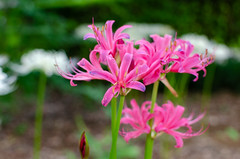With all the things happening in Japan, I felt very lucky to have already booked a three-week trip to Europe for my girlfriend and me, staying mostly with relatives. Since then, I’ve had a wonderful, eventful holiday, even better than I could have expected… more on that later.
Like a lot of people, getting out of town for a bit seemed a sensible thing to do, my only worry being power cuts or an unexpected earthquake interfering with our trip to Narita Airport. With the trains being so intermittent, we booked a convenient airport coach from Kashiwa, which we safely made our way to the airport on on the Saturday morning. With so much booked and ready, it was a relief to get there without a hitch. There was then a series of very long delays getting to London, leading to us spending hours in Narita and Hong Kong airports. The situation being so extraordinary, I didn’t mind so much and British Airlines also gave us some generous food coupons that meant we could get whatever we liked at the places that accepted them.
Now I’m here, we are still checking the news in Japan. No major quakes near us appear to have happened and the reactors, though still producing radiation, seem to be far more stablized than when we left, when some kind of sudden explosion was not beyond the realms of imagination or the wilder speculations of the press. Shortages still seem to exist, especially with bottled water and fuel and the coast is not entirely clear.
We can only hope that the careful measures to contain the radioactivity pay off. Japan being a small country, they can’t afford to let a large area go to waste the way that happened with Chernobyl and I expect they will reduce the damage as much as possible. Hearing about a Fukushima farmer committing suicide when he heard that his rows of perfect, organic cabbages were no longer sell-able brought home to me the human cost of this drama. The Japanese authorities have a difficult task weighing this along with the dangers of cutting people off from their homes, lives and livelihoods.
Different governments have been saying different things, sometimes contradicting earlier attitudes. The French government, for example, recommended leaving all but Southern Japan, yet when actual radioactive fallout fell on their produce from Chernobyl (obviously, a much worse accident), unlike neighbouring Italy they declared an all-clear and refused to ban any sales, saying that any radiation had miraculously ‘stopped at the Italian border’. So we who have deep connections in Japan have to be aware of the political motivations behind foreign government’s advice, mainly aimed at their own non-essential citizens who might otherwise get in trouble and often involving some grandstanding of their own, to decide for ourselves how cautious we feel we need to be. To me the US/UK recommendation of 80km makes a lot of sense, weighing on the side of caution without being too over the top.
Not being an expert, I can’t give any advice (and the current fashion for people who know a little bit to be trying to seems a bit mistaken), but there seems to be a consensus that, especially for adults, very low levels of exposure are safe. Perhaps we should be more worried about pesticides and other pollutants, I don’t really know. It’s certainly something we need to decide for ourselves about, if only for peace of mind. I project that just as before, the real problems will be nearer to the events, further afield being psychological fear, which has a power of it’s own. I hope and pray that the effects will turn out to be very mild, which is what the plant was designed for.
As for precautions, when I go back I expect I’ll be more careful about wind and ‘acid rain’ coming from that direction for some time to come. I expect farmers downwind of it will have periods when their produce is deemed unacceptable, fairly or not. But living far away from the source in Chiba-Ken, I’ll be carrying on with my life as normal as much as possible. Thankfully, in a series of heroic actions, the early chance of a spectacular meltdown billowing into the air has been so reduced as to be practically impossible (if in fact it ever was, I tend to think that it couldn’t be ruled out as we never know for sure). There is always the chance of a big Kanto earthquake, but that’s nothing new, in fact the one that happened could just as well been in Kanto. I’d really understand people not going there or not going back and also the fact that people will worry about me being there. I appreciate the concern, yet however worrying it is, the risks where I am are so low and the good things about carrying on living there are so many, that I am going to go back. My students will really appreciate having my class. Please remember that when it talks of what could happen, the media is generally sensationalistic, which is the only way of getting people’s attention.
Hopefully things keep returning to normal, the power and trains get stablised as they bring online more power plants. Just being alive remains a miracle. I intend to keep enjoying it, whilst doing what I can to help others, which includes cheering them up. I actually think this is a great thing we can do for our students, who even if they haven’t been directly affected, may still have been worried by things. Seeing how well people have co-operated, kept calm and looked after one another is really moving to see.






